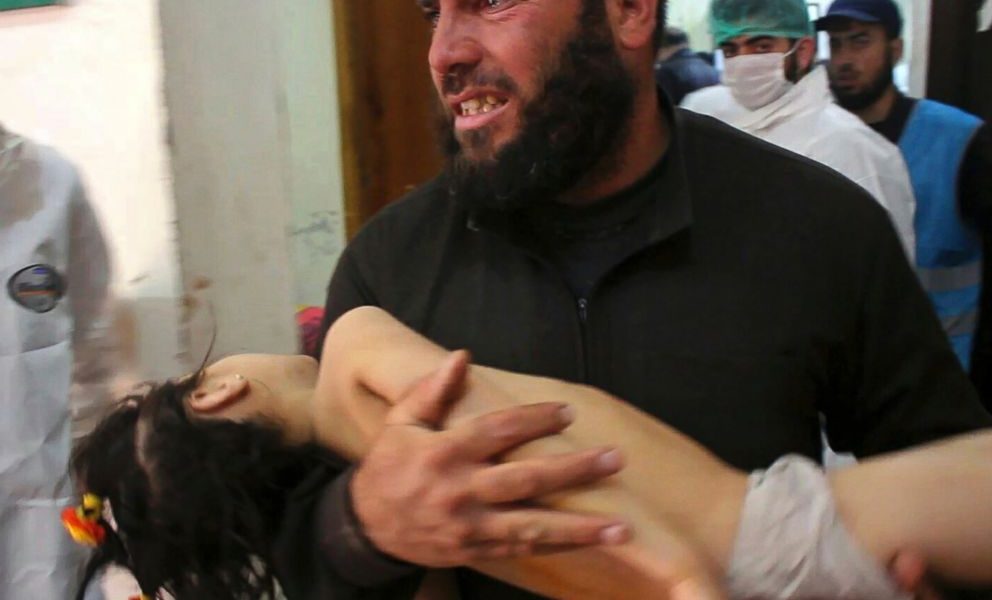
Syrian doctors talked to ABC(American Broadcasting Company) News about treating some of the youngest victims of the chemical attack that happened in Northern Syria yesterday.
Some of the children died even before they reached the hospitals while many kids asked for their parents as they were given the treatment.
Mizar Hassani is a doctor working in a hospital in Idlib- around 30 miles from the Khan Sheikhoun town where the attack happened. The doctor said that of the around 30 patients that he treated, four were children.
“They just work up to find everything in their life changed,” he said, adding that the kids kept crying.
“When we receive them they are crying … we will give them our medication, our treatment. When they wake up they are crying,” he said, “I cannot continue … their father, mother died. What will we do for them?,” he added.

Children at hospital six hours after attack
The children that he treated have survived. He said that they’re doing better now. When the victims were first brought to the hospital, they were drowsy and agitated. They had lesions and runny noses. These, he said, are symptoms consistent with a gas attack.
Abdulhai Tennari is another person who treated victims. He said that the attack took place at 6 AM local time. Kids began to arrive at his hospital around six hours later.
“Children arrived dead,” he told ABC News. “They were found under the rubble. There are children who don’t have their parents. We don’t know where their parents are. We treated them and are looking for their parents. Their parents might be looking for them.”
The doctor said that many injured died immediately on the spot. Others died while they were brought to the hospital. Some of them survived and they were treated. He said that among the killed, most died from choking on gas.
19 children dead
Since Syrian hospitals were at capacity, many patients had to be transferred to Turkey. As per the Syrian Observatory for Human Rights, at least 59 civilians were killed in the attack, including 19 children.
A statement issued by the Syria Civil Defense and the Health Directorate in Idlib says that over 50 people were killed and 300 injured.
“The problem is that it’s a long way from Khan Sheikhoun to us in Idlib and then to Turkey. The patients are in serious condition and might die because of the delay of their treatment,” Tennari said. “I have patients who are still not awake.”
According to the organization, ‘Save the Children’ the medics in the region told them that nearly a third of the casualties they see are children. They arrive at the hospitals pale and unconscious or struggling to breathe.
“Doctors at a health clinic run by our partner Syria Relief told us they received three children under 6 years old today,” Sonia Khush, the Syrian director of Save the Children, said. “They were struggling to breathe and barely conscious, with running noses and contracted pupils – doctors say these symptoms are consistent with the use of nerve agents such as Sarin.”
Symptoms consistent with nerve agents
If it’s confirmed that a banned chemical substance has been used, it would be a clear violation of international law. It would also indicate that not all chemical weapons were destroyed in the country as demanded in 2013 by the UN Security Council Resolution.
As per Syria’s Foreign Ministry, Damascus is committed to its obligations under the Chemical Weapons Convention. The nation joined the Convention in 2013. The Ministry denied that such agents have been used in yesterday’s attack.
In a statement issued by the ‘Organization for the Prohibition of Chemical Weapons’ it’s said that they are gathering and analyzing information about the attack from all available sources.
“The OPCW strongly condemns the use of chemical weapons by anyone, anywhere and under any circumstances,” the organization said in a statement.
As per the Syrian American Medical Society, its doctors have seen patients with pinpoint pupils, loss of consciousness, foaming at the mouth, slow heart rate, slow breathing and vomiting as also spams and other neurological symptoms that point to the use of nerve agents.
Image credits: abcnews.go.com